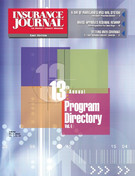Even as Massachusetts tackles the challenge of making the state’s private passenger auto system more like that in other states (see story page 18), independent insurance agents must continue to play by the state’s unique rate-setting procedures which require them to prove their worth.
This year, in addition to having a cost study of agencies done by Tillinghast to support their commission recommendation, agents are having to defend themselves against some disparaging testimony by a witness from the state attorney general’s office.
In Massachusetts, more than 80 percent of the private passenger auto market is sold through independent agents. However, Stacy Gotham, representing Attorney General Tom Reilly, testified that she was not convinced that independent agents provide a benefit to consumers and believes they may even be a hindrance to a competitive market.
“I personally have not received much benefit from it. Probably some individuals feel that they do receive a benefit from it, but I don’t know,” she testified.
“My opinion is that, in most other states, people don’t use independent insurance agents, and as far as I know, people are not in an uproar about it,” she added.
She questioned whether the fact that 86 percent of exposures are sold through independent agents is an indication that perhaps agents do supply benefits.
“I don’t know if you can directly conclude that. Most of the national carriers that don’t use independent agents are not located here. And it may be that the proliferation of agents in the state is seen by them as somewhat of a barrier to entry. In that respect, I think it’s a negative,” Gotham concluded.
To independent agents, those are fightin’ words.
The Massachusetts Association of Insurance Agents (MAIA), which represents some 1,700 agencies with 8,500 employees, blasted Gotham and the AG’s office for that opinion in its final brief and in a strongly worded letter from Frank Mancini, MAIA president and chief executive officer, to AG Reilly himself.
“Ms. Gotham’s claim that independent insurance agents provide no benefit to policyholders in the insurance transaction is outlandish,” Mancini wrote. “If no benefit were gained from conducting business with an independent insurance agent, why would over 80 percent of the Massachusetts insurance-buying public choose to do business with them?”
Mancini urged Reilly to reconsider his office’s “unenlightened position on the benefit of independent insurance agents” and encouraged him to visit agencies to learn firsthand of the services they provide.
In his letter, Mancini also told Reilly that independent agents are small business men and women who are trusted by consumers and respected in their communities. “Most of the Massachusetts agencies are family-owned, covering two or three generations or more. Over 100 of our member agencies are over 100 years old,” Mancini pointed out. “They are survivors in a business climate where ‘bigger is better’ because they provide the professional service and advice consumers need and want in purchasing protection for their families.”
Gotham’s testimony was just the latest in a continuing scuffle between agents and Reilly’s office. For a 2005 average auto commission, Mancini’s organization has recommended a 32 percent hike to $150.84; the state rating bureau of the insurance division is touting $119.02; and the attorney general has come in at $114.00, which is what it was in 2004. The AG has been pressing for tax returns and additional documentation to back-up agents’ request for higher commissions. MAIA refused to supply the AG with the names of the agencies in the cost study.
The stance taken this year is in keeping with the AG’s approach to agents’ compensation in the past. Last year, Reilly went to court to challenge the 2004 auto rate decision, arguing in part that agent commissions had not been substantiated. The court rejected the AG’s concerns and upheld the bulk of the 2004 decision.
Was this article valuable?
Here are more articles you may enjoy.


 Zurich Insurance and Beazley Agree to $10.9B Cash Acquisition
Zurich Insurance and Beazley Agree to $10.9B Cash Acquisition  Florida Appeals Court Pulls the Plug on Physician Dispensing in Workers’ Comp
Florida Appeals Court Pulls the Plug on Physician Dispensing in Workers’ Comp  Commercial P/C Market Softest Since 2017, Says CIAB
Commercial P/C Market Softest Since 2017, Says CIAB  Deep Freeze and Drought Fueled a Massive Florida Wildfire
Deep Freeze and Drought Fueled a Massive Florida Wildfire 


